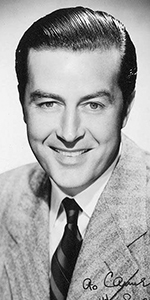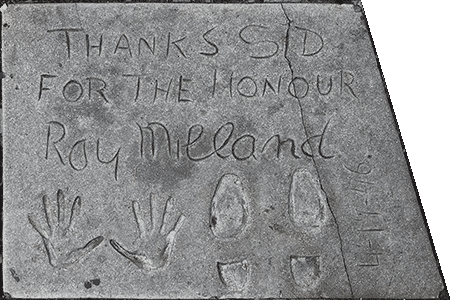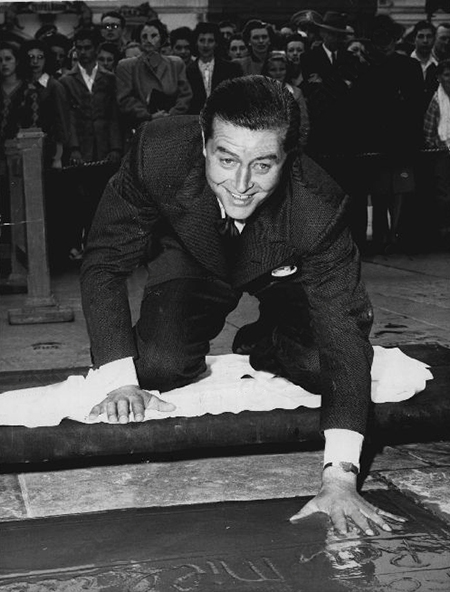 |
 |
 |
 |
 |
| Ray Milland, date unknown. |
| |
|
 |
|
| |
| |
| |
| |
|
|
| Ray Milland
|
 |
| Forecourt Ceremony held on Thursday, April 17, 1947 |
| |
Born: Reginald Alfred Truscott-Jones, January 3, 1907, Neath, Glamorgan, Wales
Age at the time of the ceremony: 40
Died:
March 10, 1986, in Torrance, California, age 79 |
| |
With his good looks and wonderfully accented voice, Ray Milland became a popular leading man in movies during the 1930s and 40s. After bagging an Oscar for Best Actor, he held on to his craft, acting in cheapie horror films, which at the time, seemed — unseemly, but in fact was a testament to his desire to work.
Milland's father was a steel mill supervisor, who had had an adventuresome career, but barely spoke of it to his young son. Educated at King's College School in Cardiff, Ray left home at the age of 21. Becoming a member of the Household Cavalry, Ray became an expert marksman. A chance meeting with American actress Estelle Brody resulted in Ray getting out of the service to concentrate on acting.
Starting out as an extra in Piccadilly (released in June 1929), his reputation with the rifle got him a part in The Informer (released in October 1929). The director working on the next-door stage saw him and cast him in a thriller The Flying Scotsman (released in May 1929). He took the phrase Mill lands as his stage name: Milland.
Milland did a few more films, but was unsure about his technique. Touring in a production of The Woman in Room 13 for five months brought him a certain amount of experience, which led to his being offered a contract in 1930 by Metro-Goldwyn-Mayer to make pictures in Hollywood.
The director of his first US film, Son of India (released in August 1931), berated him for his poor acting in front of the entire crew. Humilliated, Milland wanted out of the whole deal, but M-G-M execs talked him into staying the course. More small parts ensued, allowing Milland to meet, woo and marry Muriel Frances Weber; the two would remain married until his death.
M-G-M decided to let Milland go from his contract in 1932, causing him to move back to Britain, but work was impossible to find. Leaving his wife there, Milland returned to Hollywood, doing odd jobs until he was cast as a last-minute replacement in a George Raft picture Bolero (released in February 1934) at Paramount. Ad-libbing a scene with George Burns and Gracie Alllen in We're Not Dressing (released in April 1934), so impressed director Norman Taurog, that Milland was put under a seven-year contract at Paramount. He was loaned out to Universal for Next Time We Love (released in January 1936), and Three Smart Girls (released in December 1936).
The Dorothy Lamour picture The Jungle Princess (released in December 1936), found the actress asking for Milland to be her co-star. The picture worked, and suddenly, Milland was in the ranks of leading men. They kept him busy: Bulldog Drummond Escapes (released in January 1937), Easy Living (released in July 1937), Hotel Imperial (released in May 1939), Beau Geste (released in July 1939), and Everything Happens at Night (which played the Chinese in December 1939). He returned to Britain to appear in the film version of French Without Tears (released in April 1940), then returned to the US after Pearl Harbor; he was rejected from military service due to an accident which impared his hand. He became a flight instructor for the Army and toured with the USO in the Pacific Theatre.
Paramount kept him busy meanwhile, where he starred in pictures like I Wanted Wings (released in March 1941), Reap the Wild Wind (released in March 1942), The Major and the Minor (released in September 1942), and Ministry of Fear (released in December 1944).
Milland's greatest succest came in the film The Lost Weekend (released in November 1945), with him the focus of a ground-breaking film. So ground-breaking that Paramount seriously considered shelving it, but the film was rolled out slowly; critics were wowed, and the public agreed. Milland won the Best Actor Oscar on the stage of Grauman's Chinese on Thursday, March 7, 1946.
Films he did after winning the Oscar include:
Golden Earrings (released in August 1947), The Big Clock (released in April 1948), Close to My Heart (released in October 1951), The Thief (which played the Chinese in October 1952), and Dial M for Murder (released in May 1954).
Television bekoned, and Milland answered the call by playing Professor Ray McNulty in The Ray Milland Show on CBS from 1953 to 1955. While working in television, Milland went into directing, helming and starring in a western, A Man Alone (released in October 1955), and Lisbon (released in August 1956). He also directed television shows such as Schlitz Playhouse in 1957, Suspicion in 1958, and episodes of General Electric Theatre in 1956-1958.
Milland the voice of Satan in the remake of King of Kings (released in October 1961), and starred in and directed Panic in the Year Zero! (released in July 1962), and played the title role in X: The Man with the X-Ray Eyes (released in July 1963). He starred and directed Hostile Witness (released in November 1968) and Love Story (released in December 1970). Milland published his autobiography, Wide-Eyed in Babylon in 1974.
Milland did a lot of television, guest starring on shows like The Name of the Game, Night Gallery, Columbo, Ellery Queen, Rich Man, Poor Man, Battlestar Galactica, Fantasy Island, The Love Boat, etc, etc, etc. He was busy right up to the end. Milland died of lung cancer in 1986 at the age of 79. |
|
|
|
|
| |
 |
 |
| Grauman's Chinese Theatre, Hollywood, California. Ray Milland Forecourt block. Executed by Jean Klossner, Thursday, April 17, 1947. 45 x 30 inches overall. |
 |
 |
 |
| Grauman's Chinese Theatre, Hollywood, California. Ray Milland Forecourt ceremony, Thursday, April 17, 1947. Ray Milland gives out a happy smile as he places his handprint into the cement. |
|
|